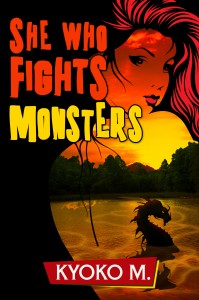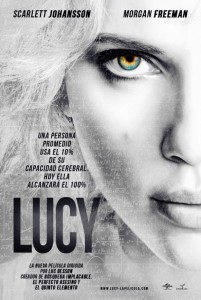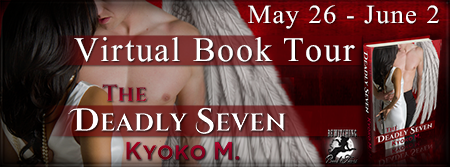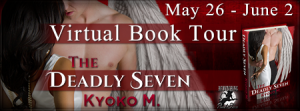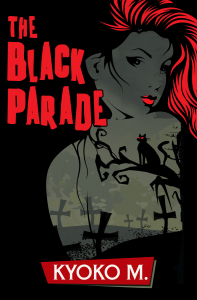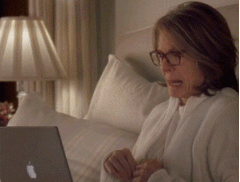Hello, darlings! The Deadly Seven has been out for exactly one week. So far, it’s sold 489 copies. Woop woop!
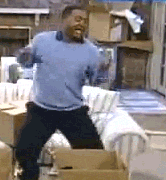
In celebration, here’s the first short story, “WRATH”, for your reading pleasure.
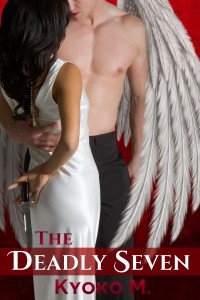
WRATH
Being Jordan Amador’s angelic bodyguard against a horde of bloodthirsty demons was a lot of things, but certainly not boring.
I checked my watch for the fortieth time in the last twenty minutes. Jordan usually got off at eight o’clock. Things had been quiet for over two weeks now, which was rare for a Seer’s lifestyle. She encountered ghosts with unfinished business a few times a month and that kept the both of us busy. Earlier, she had convinced me to meet her at the bus stop a couple streets over instead of in front of the Sweet Spot.
“So would you mind waiting for me at the bus stop instead of out here?” she had asked, sweeping her shoulder-length black hair up into its usual high ponytail.
I frowned. “Why? Doesn’t it kind of defeat the purpose of the whole ‘temporary bodyguard’ thing?”
“It’s been quiet for a while now, Michael. Come on. Ganking an archdemon isn’t enough to prove I can take care of myself?”
I glanced between her and the store front. A couple of her waitress friends who were watching us through the window scattered as soon as I looked over. Then it clicked.
“They think I’m your boyfriend, huh?”
Jordan got really interested in her shoes all of the sudden. “Yeah. They do.”
I shook my head. She was an anointed soul charged with helping the dead find peace and yet she still cared what her coworkers thought of our relationship. I couldn’t decide if it was cute, frustrating, or hilarious. Possibly all three.
Then again, I could see how her coworkers would get confused when a six-foot-tall, dark-haired, green-eyed “underwear model” (which I overheard one of them dub me last week) dropped Jordan off at work on a frequent basis. I decided to be lenient for once.
“Fine. We’ll give it a test run today. If you survive, I’ll take it into consideration.”
She shot me a scowl. “Gee, thanks, almighty Michael. I am humbled that you considered the request of a lowly human.”
I grinned. “You’re welcome, my humble servant.”
She rolled her eyes and swatted my arm before turning to head into the restaurant. “Later, pretty boy.”
“Stay out of trouble.” I called, and then headed back towards the bus stop.
That had been eight hours ago. Getting off a shift late wasn’t unusual for a waitress, but most times it was by only five or ten minutes. My instincts needled at me that something was off.
Sighing, I fished out my cell phone and called her, tapping my foot. “Come on, Amador, pick up.”
Several rings. A click. Voicemail message. Ugh. I hung up and stuffed my hands in my pockets. It was a short walk through the heavily trafficked area on this side of Albany, New York, but it was during one of the busier times of the day. Nighttime in the city meant chatty couples walking through holding hands, teenagers hollering and chasing each other down the street, and music pouring out from the clubs already packed to the rafters with twenty-somethings.
Two stop lights, one near-death experience courtesy of a speeding cab, and one step in some gum later, and I reached the glowing red sign to the Sweet Spot. The Southern cuisine eatery was busy. As much as Northerners made fun of the South in sitcoms and stand up shows, they sure did like the food.
I pushed the door open and smiled at Beth, the head hostess. “Hey, you.”
“Michael.” The short blonde grinned. “Good to see you, as always.”
“Is Jordan still in the back?”
A slight frown marred her brow. “No, honey. She left about ten minutes ago.”
I froze. “Left how? She was supposed to meet me at the bus stop.”
“She went out back to take out the trash and I just assumed she went home after. Why? Something wrong?”
A cold lump settled in my stomach. Something wasn’t adding up. Jordan wasn’t the type to disappear without texting me. I didn’t want to concern her friends so I kept my expression pleasant. “Nah, she probably just wandered off to window shop. I’ll catch up with her. Thanks, Beth.”
“No problem, sweets.”
I made a point to leave the restaurant in a casual manner, but once I was out of sight, I hurried around the block to the back of the building. The Sweet Spot was part of an entertainment district in this section of Albany. There were narrow alleys between the establishments and the streets ran parallel to the store fronts.
The Sweet Spot’s back alley looked like any other restaurant in Albany—lined by dumpsters and garbage cans. The concrete was littered with fallen bits of food. A couple of mangy cats fought over fish bones. The entire area stank to high heaven. I called Jordan’s phone again and prayed that my instincts were wrong.
The raucous chorus to Right Said Fred’s “I’m Too Sexy” echoed behind me.
I turned towards one of the dumpsters and lifted the entire thing with one hand. Her phone lay cracked and forlorn underneath it.
I tucked her phone in my pocket, forcing myself to calm down. Think. What was my next move? Calling the cops would be ill-advised. They’d take forever, and even if they found her, there was no telling how many innocent officers could die trying to save her. I knew angels in the police department, but they couldn’t drop everything for me. Better check for evidence.
Jordan had basic self-defense skills and moderate experience fighting demons, so I guessed it would have taken more than one of them to subdue her. The lack of blood implied that they didn’t hurt her on the spot, so that ruled out an assassination attempt. Two weeks ago, Jordan and I had foiled a plot by the archdemon Belial and sent him back to Hell. I bargained with the heavenly Father to remain on earth at her side in case Belial wanted retaliation. Up until today, there were no attempts on her life. Stupidly, I’d let my guard down and now she was gone.
The alley was wide, but blind. It led to a small road to the right. They would’ve parked the car there, jumped her and knocked her out, and then carried her to it. The assailants needed to haul ass to avoid anyone seeing an unconscious woman tied up and thrown into their trunk.
I dialed Gabriel’s number. It rang a few times, but he picked up eventually.
“Michael. How are you this fine evening?”
“Jordan’s in trouble.”
My brother’s voice hardened into granite. Not surprising. He’d known Jordan longer than I had and was fiercely fond of her as well. “What happened?”
“I think someone made off with her after her shift at the restaurant. I’m there now. I need you to find the closest demon’s nest to here. I’ll give you the address.”
“Alright, go.”
After I told him, I paced back and forth as I waited, my mind whirring with theories. The average demon never kept the same nest location. They switched every couple of weeks because they knew angels tracked them. The places they used were always abandoned, foreclosed, or in rough neighborhoods thick with crime. Most demons were under orders to keep tabs on one another and dispense orders from any of the five Princes of Hell. The ones who kidnapped Jordan were probably members of the local gang of losers.
“One of our sentries says there is an old house outside the city where they take their victims. This particular establishment is akin to…”
“Akin to what, Gabe?”
He exhaled. “…a slaughterhouse. The angels with the police department have been trying to gather evidence, but all they have is missing people and no traces of the murders.”
Slaughterhouse. Images of Jordan strung up and split open flickered through my mind.
“Text me the address.”
“Michael—”
“Text. Me. The. Address.”
“…yes, brother.”
I hung up and waited, trying to distract myself with positive thoughts. Jordan wasn’t some damsel in distress. She was smart, tough, stubborn, and a crack shot. If she’d been carrying when the demons came for her, I might not have been on this rescue mission.
My phone buzzed with a text message a second later that had the address. Time to go.
Under any other circumstance, I’d take a cab, but Jordan was in the company of murderers, which gave me a valid excuse to bend the rules.
I summoned my spiritual energy from deep within. Coolness billowed through my limbs and filled them with supernatural powers. Once it thrummed through my veins, I opened my eyes and concentrated on the most direct route from here. I bounced on my heels once, twice, thrice, and then released the clutch.
To the untrained eye, I’d seem like nothing more than a heavy breeze, but in reality, I was running so swiftly that not even the fastest shutter speed on a digital camera could see me. I darted between cars, around fire hydrants, on the outskirts of the crowded sidewalks between the restaurant and the demons’ nest. Huge gusts of wind kicked up in my wake, scattering fallen bits of trash and scaring the hell out of several dogs. The distance from here to there was about eight miles. I made to the area in less than five minutes.
The house was at the bottom of a hill of long dead brown grass and surrounded by a high black iron fence. The exterior had been painted white at some point, but the wood on the outside was mildewed and splintered all to hell. It looked more grey than anything else, like one of those hideous places children made up ghost stories about.
The property was situated by itself for several acres, ensuring that no neighbors would ever hear the screams of their victims. I estimated Jordan had been with him for less than an hour, so it was likely they hadn’t hurt her too much. If they had…God help them.
I pressed my back against the gate. Ivy leaves tickled the nape of my neck as I huddled there and sniffed the air twice. Faint scent of sulfur. Hellhounds. If they saw me, my chances of getting her back unharmed would be slim. Their barks could be heard for miles. I’d have to keep them quiet.
Gathering my legs beneath me, I leapt over the six-foot fence and landed on my knees in the cool grass. The front yard was about thirty feet from the porch. No hounds yet.
I stayed low and slunk towards the rear of the house, stepping lightly to muffle the crunch of the brown grass underfoot. I made it to the side of the house and flattened myself against the flaking paint on the walls. I peeked around the corner.
There were four hellhounds—each the size of a full grown mountain lion and covered from head to toe in shaggy black fur. Two were lying on the wooden back porch, sleeping. The other two entertained themselves with the hollow shell of an Oldsmobile. One yanked off the driver’s side door and tore into the upholstery as if it were nothing more than paper. Another raked its sharp claws down the rear passenger’s side. The metal screamed under its nails. It yawned, revealing rows of long glistening yellow fangs that could rip through solid steel.
They hadn’t smelled me yet. I was downwind, but they’d catch my scent if I made a move toward them. Then again, maybe that was what I wanted.
I slipped my seven-inch retractable Green Beret knife out of my back pocket and cut a thin line across my left palm. Warm blood dripped from it onto the grass. Low growls reached my ears. I checked around the corner again. All of them were awake and sniffing the air, their long ears flattened against their skulls. Nothing attracted hellhounds like fresh blood.
Quickly, I scattered a wide circle of blood droplets in the grass and then stood just outside of it. All four hounds came dashing around the corner, their red eyes like deadly firelight in the dark, and they pounced straight at me.
As soon as their bodies crossed the blood lines, a flash of red light shot upward and trapped them inside the circle. They smashed against an invisible force field and collapsed into a limp, whimpering doggy pile. I extended my bloody hand and spoke the Latin incantation to exorcise them. Black smoke poured out of their thick hides and then evaporated, shrinking them down to normal size. When the hellish energy dissipated, I was left with two pit bulls, a golden Labrador, and a beagle. They sat on their haunches and wagged their tails, confused but happy to see me.
I continued around the back of the house. It was a farmhouse with three steps leading to the porch with a rickety swing and a screen door. The windows were boarded up. No matter. I wouldn’t be going in that way anyhow. Demons were smart enough not to do their dirty work above ground level.
The west side of the house had exactly what I had been hoping for—an old-fashioned storm cellar door. A heavy chain was wound around the rusty handles, but that didn’t make a difference. No force on earth was going to stop me from getting her back.
I pressed my hand against the rotted wood and uncurled my spiritual energy enough to sense if there was anyone home. Then I felt it. Jordan’s energy signature. She was here, and she was still alive. Relief spilled over me like cool spring water.
I straightened and held my arm up to the night sky. Grey clouds slid together over the moon and darkness gathered. The wind kicked my hair into my eyes. A low grumble of thunder answered my call. Lightning flashed and then my sword flew down into my hand. Its long, narrow blade glowed like silver fire in the dark, aching to be used.
A dark part of me chuckled at the thought of what the demons would do when they found out the archangel Michael had come for their captive. The sword itself would be enough to scare them shitless—it was akin to a saber, with a thin, slightly curved blade that was lightweight and easy to wield. The handle was pure silver with patterns beaten into it depicting the moment I had cut the side of Satan and assured our victory.
Male voices reached my ears as I sliced through the chains holding the cellar doors shut.
“Hey, did you hear thunder just now?”
“No. All I hear is your gums flapping. Now hold her still. I can’t do anything with her wiggling around like she is.”
Don’t charge in, I reminded myself as the last of the chains fell aside. You might get her killed. Stay smart.
The door’s old hinges creaked just a bit as I lifted it enough to see into the basement. The stench of dust and rot flooded into my nostrils. The basement was dimly lit with a few naked bulbs so my eyes had to adjust. Concrete floors. Mold. Cobwebs. The room was L-shaped, with the stairs on the left and the main room towards the right. Work tables had been pushed against the far wall, along with discarded furniture. Bloody instruments crowded nearly every available surface.
There were two demons standing in front of Jordan—one chunky blond with curly hair and the other thin with black buzzcut hair. They were both in jeans and wifebeaters despite the chill of the basement air. The blond had a fresh burn scar along the left side of his neck that I knew was the result of holy water. The dark-haired demon’s forearms were stained from several cuts. The skin below his left eye puffed like he’d been punched.
Jordan hung from her wrists, swinging gently as the curly haired demon came up behind her. Her eyes were half-lidded as if she’d been tired out from fighting. Dried blood crusted on her forehead, probably from where they’d knocked her out. The entire right side of her throat shone dark red with blood. Some of it had dripped onto her white dress shirt. The bottom of her knee-length black skirt was torn. Her fingernails had something brownish underneath them. She hadn’t been an easy captive. Good girl.
The blond demon’s hands gripped her waist. Jordan thrashed like a landed shark. Her brown eyes opened completely and she kicked the dark-haired demon right in the nose. His head snapped back, but he didn’t cry out as blood splattered down the front of his face.
Buzzcut wiped the blood off his chin and spat out a mouthful. He laughed and twirled the butcher knife in his hand. Demons were built to take punishment like that a thousand times over. Jordan knew that; I assumed she’d done it just to spite them.
“Man, she’s a live one,” the dark-haired demon said. “She’s still fighting.”
“I’ll dope her with something in a minute. Hurry up. That first taste wasn’t enough. I’m hungry.”
Jordan tried to say something through her gag. Buzzcut held the knife under her chin and growled, “You scream and I’ll slit your throat.”
He pulled the filthy rag down from her lips. She took a couple of breaths and then gave him a death glare. “Last chance, knuckleheads. Let me go or you’re both dead.”
Curly laughed. “God, I love her. The other Seers weren’t nearly this much fun. We’ve got you all to ourselves and you’re still convinced you can win.”
“Not can, you ass-clown. Will.”
“Oh yeah?” Buzzcut sneered. “What makes you so sure of that?”
“Because there’s an archangel standing behind you.”
Buzzcut didn’t get out another word. I ran him through with one stroke. The tip burst through his chest cavity and he choked on his last breath, stricken.
Curly screamed as his friend hit the floor, his eyes so wide they looked like China plates with olive pits in the middle. He held an eight-inch bayonet knife beneath Jordan’s ribs, using her as a human shield.
“Take one step closer and she’s dead!” he shrieked.
“Get…your hands…off…my friend,” I said through clenched teeth.
“Drop the sword. I swear I’ll spear the little bitch like a roasted pig if you don’t.” To emphasize his point, he jabbed the blade into her side. She jerked in her restraints and dark red blossomed outward like a morbid rose pattern in her blouse.
My fingers tightened around the hilt. I glanced at Jordan. “Close your eyes.”
“What?”
“I don’t want you to see this.”
She gave me a searching look and then did as I asked.
“Last warning. Back away from her.”
“And I told you to—AAAAGH!”
I sliced his right arm off at the shoulder. The bayonet and his arm hit the floor with a sickening thud. Blood sprayed all three of us. Curly, still screaming, stumbled away from Jordan. I took a stance in front of her.
“You son of a bitch!” the demon spat as he fumbled for the knife still clasped in his dismembered hand. “I’ll kill you!”
He ran at me with the weapon aloft, aiming for my head. I caught his wrist on the downward stroke and shoved the sword through the space above his collarbone. He jerked forward and twitched, staring at me from inches away. Fear filled those beady eyes, followed by panic. Blood oozed from the wound, joining the widening puddle made by his severed arm.
A nasty chuckle escaped my lips. “Congratulations, demon. You have finally managed to piss me off.”
I tightened my grip on his wrist and broke it in one swift movement. He cried out again. I savored the sound. I kicked his left kneecap and he collapsed in front of me. I left the sword where it pierced him instead of going for the killing blow. He broke into violent shudders. More blood welled from between his lips and spilled down his front.
“You must have heard by now what happened with Belial. He set his sights on this woman and thought he could just take what he wanted from her. He was sorely mistaken, as you are right now.”
I grabbed a handful of his hair and jerked his head back so he’d have to look up at me. “She restored my life. Without her, I’d be walking the earth lost and alone. You must understand how it makes me feel that you’ve got her strung up like some bovine carcass.”
“D-Didn’t know…you were…protecting her…” the demon stammered in between wet gulping breaths. “Just thought she was…alone…”
“But that’s what you do, isn’t it?” I said, casually twisting the blade a bit just to watch him cringe. “You stalk and you feast on those that you think are your prey without considering the consequences.”
I ripped my sword out of his chest and then kicked him in the sternum. He fell onto his back. I jammed the tip of the blade through his left hand, pinning it to the floor. He bucked upward with convulsions and a whimper crawled out of his throat.
“P-Please just k-kill me. I’ll never t-touch another Seer again. I s-swear!”
“Why should I show you mercy? You weren’t going to do the same. Maybe I should just cut loose. No one will find you here. I could lay into you for hours. Make you a tourniquet for that arm and slice you open. See what makes you tick. Pull your soul out of that fat dump of a body and toy with it until I’ve had my fill. Does that sound fun to you, demon?”
I shoved the sword an inch deeper into the punctured mess in his hand and he yowled like a beast with its leg in a bear trap.
Then Jordan spoke from behind me.
“Michael, please.”
Just those two words were like a bucket of ice water dumped over my head. I realized what I’d been doing. Her safety was far more important than my desire for revenge. Still, I couldn’t let this slimy bastard think I’d gone soft.
“Take this message to your people, you obsequious little worm,” I murmured. “Anyone who lays a hand on Jordan Amador will have to answer to me. Now do me a favor and go to hell.”
I removed my sword from his hand and then decapitated him. His severed head tumbled across the floor like a wayward bowling ball. Good riddance.
I set my sword aside, found a stool in the corner, and climbed up in front of Jordan. Her handcuffs were attached to a huge meat hook bolted into the ceiling. I lifted her off of it with great care, unsure if she had the strength to stand. As soon as her arms were free, she looped them around my shoulders and pressed her face against my neck. She was trembling, but not crying. I sank to the floor and cradled her in my lap, breathing out the last of my anger now that she was safe.
“‘M sorry,” she mumbled in a small voice. “I’m so sorry, Michael.”
I snorted. “What the hell do you have to apologize for? You got kidnapped. Pretty sure that’s not your fault.”
She shook her head, her words partially muffled as she pressed her face against my shirt. “Should’ve been stronger. I could’ve gotten you killed.”
“By Heckle and Jeckle here? Not likely.”
A shaky laugh rattled through her. She slid her fingers into the hairs along the nape of my neck and hugged me tighter. I knew from experience she didn’t want me to see her face because she knew she was only seconds away from breaking down. No one would ever accuse Jordan Amador of being a crybaby, not if she could help it. It was a ridiculous notion at best, but I indulged her anyway.
“Thank you.”
“Just doing my job. But you’re welcome.”
I smoothed the sweaty hairs away from her forehead enough to kiss it. She didn’t move away. We stayed there for a while without speaking, just clinging to each other until we felt strong enough to separate.
Thankfully, aside from some bruises and the wound on her neck, she wasn’t badly hurt. I broke her out of the cuffs and healed her before setting about to clean up our mess.
The demons had a huge compost heap in the backyard for disposing the unsavory bits of their victims, complete with copious amounts of lye. I dumped the bodies and then spread a liberal amount of lye on the corpses. Jordan didn’t say anything, but she had no trouble helping me haul the bodies. She had seen her share of the dead, enough to last her a lifetime, I was sure.
I ended up gathering our bloodstained shirts together in a metal garbage pail and burning them. Nothing I knew of could get that much blood out. We didn’t know if more demons would show up so there wasn’t enough time to clean up in the bathroom upstairs. I found Jordan’s duster balled up in the corner of the basement. Thankfully, it hid the residual stains on her upper body.
We caught a cab back to her apartment. She didn’t eat anything for dinner, and I wasn’t surprised. Instead, she slipped into the bathroom and took a long shower. I called Gabriel to let him know the matter had been resolved. He promised to drop by and see her in the morning.
Her bedroom door opened. I glanced over. She stood there with damp unkempt hair and oversized white Daffy Duck t-shirt. I couldn’t identify the warm feeling blossoming inside my chest. It was probably for the best.
“Feeling any better?” I asked as I stood up from the couch.
She shrugged. “As good as I’m going to feel right now.”
I nodded towards the rumpled covers on her bed. “Get some rest.”
I turned to walk away, but then she caught the hem of my shirt. I turned again. She immediately let go and stared at her bare feet.
“I know it’s a lot to ask, but would you…”
I smiled. “Yeah.”
She walked back into the bedroom. I shut the door and kicked off my shoes and socks. Jordan crawled onto the mattress and curled up on the left side. I settled down on the right. She pulled the covers up over her shoulders. I lay on my back, staring at the ceiling fan blades whirling above us.
I couldn’t tell how long I’d been lying there, but sometime later the mattress moved next to me. I cracked open an eyelid to check on Jordan. She was curled up in the fetal position and shivering despite still being under the covers. Shit.
I scooted closer and touched her shoulder. She flinched, but didn’t wake up. She was a heavy sleeper, after all.
I stroked the length of her arm for a moment or two. Gradually, the shaking slowed. After a minute, it stopped altogether. Her lithe body uncurled a little and the tension in her limbs vanished. There was still a lot I didn’t know about this girl.
Once I was sure she was okay, I grabbed an extra pillow from the closet. I got back in bed, wedged it between our lower bodies, and then wrapped an arm around her waist. As soon as she felt my presence, she snuggled her back against my chest without ever waking. I had figured as much. She’d been in a long term relationship before she met me, and some habits never wore off. It wasn’t until the next morning that I realized something startling.
I had never slept better.
—
Interested in reading the rest? Grab it here for just $.99 cents! The Black Parade is also $.99 cents. Subscribe to the mailing list and be notified the next time The Deadly Seven goes on sale for free. You can also simply add it to your Goodreads shelf for later.
Thank you so much for all your support. This week has been a dream come true for me. I never thought I’d ever see my books sell even a hundred copies, let alone 500 copies a piece. I am eternally grateful to each and every one of you.
Stay tuned for news of She Who Fights Monsters, the sequel to The Black Parade, coming in July!
-Kyoko M.
